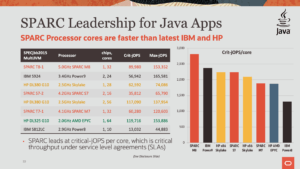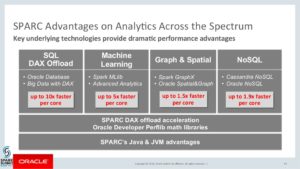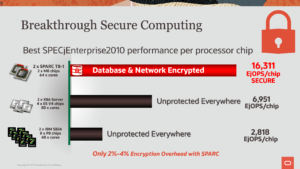Since Oracle JAVA like many other software is charged per core it might be more and more interesting where to get the most performance out per license… remember the announcement 3 years ago when Oracle brought their M8 SPARC chips – double JAVA performance than x86 and Power. Three years later that’s still true and proven by public SPEC benchmarks which show amazing results for M8 based servers. Compared to the latest and greatest x86 chips from Intel and AMD the latest SPARC chip still has 100% more capacity for jOPS and leads the critical jOPS per core! That would mean in a commercial point of view you would need double licenses for the same workload on other platforms.
And don’t forget the incredible performance when it comes down to In-Memory analytics. When M8 was announced the chip provided 10x faster results using the build on DAX engines than any other vendor. I saw comparisons now a days still showing 8x faster queries than the rest on market.
And in the end everyone talks about security but nearly no one encrypts their workload; most of the time because it ruins the critical performance. That’s not true on SPARC – encrypt all your business but only loose 2 to 4 % with end-to-end encryption and all performance features mentioned before.
So, with Moore’s law you could get the performance which will show up probably in 2 to 4 years. But looking back to the last 10 years of Intel’s single core performance it grew by 10 to 15%, especially when it comes down to multi core environments where Intel’s chips lose their ability to increase turbo modes on specific cores. On modern Platinum chips they scale very well up to 14-16 cores but using 24 or even more cores you are thrown back to the performance you got 10 years ago with 2GHz… it’s still true, if you need enterprise class systems with a predictable performance and linear scale you have to go with enterprise CPUs like SPARC.
(or Power – did I really say that?)
See the whole presentation from Bill Nesheim, SVP Oracle Solaris Engineering:
Oracle SPARC & Solaris Consistent, Simple, Secure


